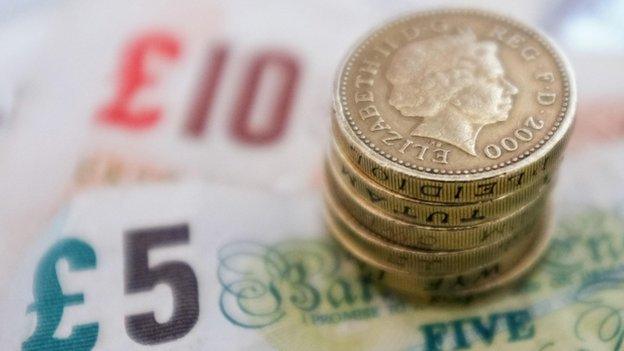Banks gearing up for full-scale competition inquiry
- Published

The CMA will announce its banking competition conclusions on Friday
Poor old banks. Just as they were looking forward to the summer holiday, along comes a new threat to their business.
The Competition and Markets Authority, the markets watchdog, has just confirmed it will be announcing the conclusions of its study into banking competition on Friday morning.
It will be a big moment.
The "big five" High Street banks are expecting action, in the form of a full-blown competition inquiry similar to the energy sector.
That could lead to banks being forced to divest businesses and allow in new competitors.
Politicians from across the spectrum are expecting the same. And there will be much anger - some maybe just a tad confected - if the CMA decides against taking action.
The man making the decision is Alex Chisholm.
He is the first chief executive of the CMA, which was officially launched in April. It is made up of the Office of Fair Trading and the old Monopolies and Mergers Commission.
If there was a World Cup in competition law - and thankfully there isn't - Mr Chisholm might be considered a bit of a Germany.
He has competition expertise coming out of his ears. He joined the OFT pretty much straight out of university after a brief stint in PR and has worked in or close to the issue ever since.
Apparently, he first became interested in competition law whilst leafing through a Monopolies and Mergers Commission report on the supply of beer.
Well, whatever floats your boat.
Mr Chisholm is the former head of the Irish Commission for Communications Regulation. And he doesn't appear fazed by the hyper-political nature of his role.
If there is an issue about markets, expect a politician to become involved soon.
Ahead of the CMA's energy market inquiry, Ed Davey, the energy minister, wrote a letter highly critical of, in particular, Centrica, the owner of British Gas.
On banking, Ed Miliband, the opposition leader, has said he will oblige the CMA to undertake an inquiry into the sector if he becomes prime minister after the next general election.
He has already said he wants the sector broken up.
Some ask if politicians are overstepping the mark and applying undue pressure on what is supposed to be a non-political process.
But I am told that Mr Chisholm believes that it is all simply grist to the mill, and he does not consider it unreasonable in any way.
Mr Chisholm will work through the data, consider the service the consumer is receiving (in this case individual and business customers) and come to a conclusion.
It is clear that banking competition is concentrated. The four largest banks (Lloyds, Royal Bank of Scotland, Barclays and HSBC) control more than 75% of the current account market.
The proportion of business lending controlled by the four is even higher, at 85%.
The Office of Fair Trading said in March that there was evidence - not necessarily conclusive - of a lack of competition in banking.
It pointed out three issues:
•the provision of small business lending was concentrated among a small number of banks;
•that new banks found it difficult to enter the market;
•that smaller businesses found it hard to differentiate between the main players and failed to shop around.
The OFT said: "A concern is that these factors, in combination, may reduce the incentive for providers to compete on price, invest in service delivery and quality or innovate, which may mean that SMEs do not get the best deal from their banking provider."
The OFT is not alone. Sir John Vickers' Independent Commission on Banking recommended a full-scale competition inquiry by 2015 if insufficient progress had been made on market reforms.
The banking industry points out that concentration doesn't necessarily mean that competition isn't working. For example, the UK retail market is highly concentrated, but very competitive.
In banking, there has also been some change. New challengers such as Tesco, Virgin Money and TSB are expanding rapidly. They will be joined by the Williams and Glyn brand, which will be split out of RBS.
Switching accounts is now much easier.
And in an age of technological innovations such as mobile banking, crowdfunding and peer-to-peer lending, the market is already changing and diversifying rapidly.
Whether Mr Chisholm is convinced by any of this, we will find out over our cornflakes on Friday.